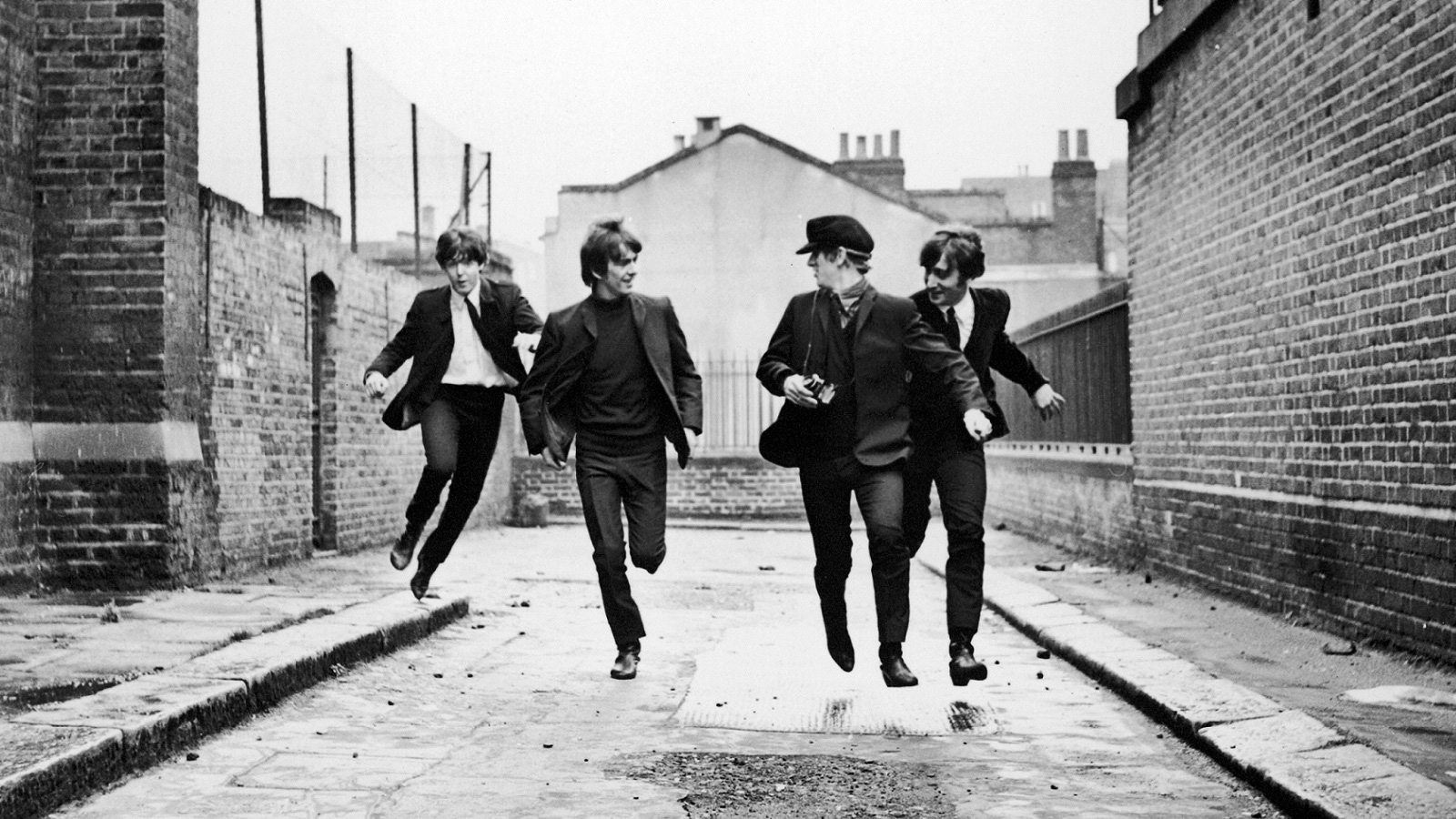A Hard Day’s Night: 50th Anniversary Re-release
Director: Richard Lester
Cast: John Lennon, Paul McCartney, George Harrison, Ringo Starr
Length: 87 mins
Country: UK
In 1964, United Artists released a Beatles film in order to secure the rights to the dozen songs composed for it. The European head of production for United Artists, Bud Ornstein, is quoted as saying: ‘Our record division wants to get the soundtrack album to distribute in the States, and what we lose on the film we’ll get back on this disc’. In other words, the people backing the film wanted to outmanoeuvre Capitol Records in releasing original Beatles songs in America. That was where the return was, they reasoned. The film itself was incidental, perhaps even an inconvenience.
Fortunately for the history of film, Richard Lester was chosen to direct. Selected by the Beatles themselves due to their fondness for his debut short, The Running Jumping & Standing Still Film, Lester saw what was essentially a shamelessly transparent marketing tool as a chance to play with an ever-evolving medium. Taking heed from the ‘cinéma vérité’-esque aesthetic that characterised the Nouvelle Vague – as well as the poetic realism of the British New Wave it inspired – Lester crafted something that looked and felt like a documentary, observing the band in grainy black and white. At the same time he ensured an inescapable sense of fun, be it through surreal flourishes (like the boys suddenly appearing outside the train window) or an endlessly inventive ‘unchained camera’ (epitomised in the hyperkinetic ‘Can’t Buy Me Love’ sequence).
This visual playfulness is anchored by an Oscar-nominated screenplay by Alun Owen, a Welsh playwright whose No Trams to Lime Street endeared him to the Beatles. Owen spent extensive periods hanging around the boys and getting a feel for their speech patterns and idiosyncrasies, as well as scouring interviews and press quotes in an effort to capture the four distinct personalities. It’s hard to question his success: watching the film, you could swear blind that the dialogue is improvised. Populated by bizarre non-sequiturs, well-observed colloquialisms and recurring in-jokes, the script lulls you into the sense that you’re watching a real dynamic unfold.
Watching it again, there’s an unmistakable electricity in knowing that in 1964 Lennon, McCartney, Harrison and Starr were on the cusp of their genius
This year, A Hard Day’s Night turns fifty. Its influence cannot be underestimated. Film historians credit Lester with leading directly to the aesthetic of late-sixties ‘swinging London’ movies. Roger Ebert went so far as to argue that the film created a ‘new grammar’ – its quick-cutting, jittery hand-held visuals and fast-paced dialogue making it a cornerstone in modern cinema. Even turning on the TV today you can see Lester’s hallmarks in music videos, from editing in time with the song’s rhythm to filming a live performance from multiple perspectives. MTV awarded him the highest honour – or greatest indignity – by crowning him ‘Father of the Music Video’.
The context into which the film is re-released is also markedly different. Half a century is a long time, and that amount of hindsight impacts the film in a variety of different ways. Watching it again, there’s an unmistakable electricity in knowing that in 1964 Lennon, McCartney, Harrison and Starr were on the cusp of their genius, so close to influencing music in a way that arguably nobody has since. In just two years they would release Revolver, one of the greatest albums ever made. The year after that they would release Sgt. Pepper and, with it, create the ‘album’ as we know it today. But fifty years has also seen its fair share of heartbreak. There is an implicit poignancy in seeing John and George, so young and full of so much potential, and knowing their ultimate fates.
Just like the music behind it, however, A Hard Day’s Night hasn’t aged a day. The infinite impersonations, parodies and homages have done nothing to diminish its impact. Its surprisingly prescient satire of the cult of celebrity and the commodification of that elusive thing we call ‘style’ is only more relevant in 2014 than it was in 1964. And, at the centre of it, we have the boys themselves. They may not be able to act for toffee, yet even in their fumbled line readings and awkward screen presences they have indisputable star power. Fifty years may have passed, but Beatlemania still shows no signs of going anywhere. With this impossibly perfect tribute, it never will.
(A Hard Day’s Night is available now on DVD and Blu-ray from Second Sight Films)

Comments (1)